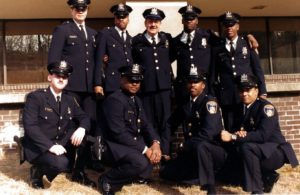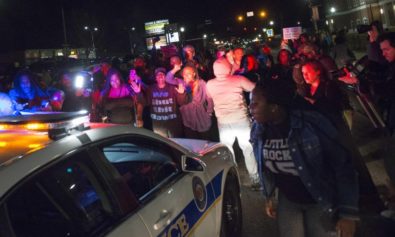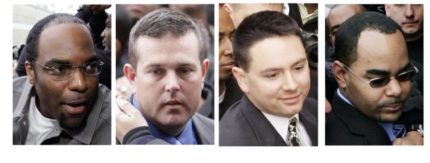
Baltimore Police Department Class Photo. Courtesy BPD.
A police force that accurately reflects the diversity of the city it is sworn to protect may be vital in reducing police shootings of African-American residents, a recent study suggests.
New York University sociologist Joscha Legewie and Columbia law professor Jeffrey Fagan examined figures compiled by the online database, Fatal Encounters, the Washington Post reports. Inspired by the 2012 fatal shooting of an unarmed University of South Alabama student at the hands of campus police, Brian Burghart created the electronic depository to help track the use of deadly force by police officers since January 1, 2001.
Preliminary research has shown that cities with sizable Black populations, yet very few African-American officers on the local force, experienced higher rates of shooting deaths among Black civilians by police. This was especially true for cities where the population of Black and whites were evenly divided.
For the study, Legewie and Fagan referenced previous research by economists at Pompeu Fabra University in Barcelona, which indicated that communities with two racial groups sharing equal numbers encounter greater social conflicts than communities with one group largely outnumbering the other or those with several different ethnic groups.
“Diverse police departments are particularly able to alleviate tensions in cities … where you have preexisting racial, ethnic tensions,” Legewie told the Post.
Even when controlling for cities’ unique socioeconomic factors, there were fewer Black people dying by police shootings in areas with close numbers of white and Black inhabitants and law enforcement officials rightly represented the diversity.
Although the study is still a work in progress, initial findings appear to support what community activists have long said about Ferguson, Baltimore and Cleveland: Black towns need more African-American cops.
While the benefits of additional Black officers patrolling Black neighborhoods are undeniable, the issue is a complex one. Some say Black officers share responsibility for disparate rates of police brutality and excessive force used against African-Americans.
The New Orleans Police Department was touted as one of the most “racially balanced” squads in the nation by the Associated Press, yet was still the focus of a Justice Department probe that uncovered widespread use of excessive force, racial discrimination, and various acts of officer misconduct.
Boston’s experimental all-Black unit, nicknamed the Soul Patrol, made record arrests in predominately Black Roxbury and Dorchester in 1971.
Three of the six Baltimore officers charged in connection to the April 2015 arrest and police-custody death of Freddie Gray were Black.
And Black cops in the U.S. continue to face the double-edged sword of combating racial discrimination on the force while walking the thin blue line.
Take the case of Kelvin Sewell.
The fired Black chief of the Pocomoke City Police Department in Maryland sued the city and Worcester County in January, alleging his termination was retaliation for not firing two other African-American officers who complained of racial discrimination. The officers joined the civil rights lawsuit as co-plaintiffs.
According to the complaint, officers were regularly subjected to “racial mockery, epithets, threats, humiliation and discrimination” by fellow cops, with one officer saying task force members threatened to take him down “KKK Lane,” left a fake food stamp PhotoShopped with a picture of President Obama on his desk drawer and put a bloody deer tail on his windshield.
Sewell joined the Pocomoke force in 2010 after serving 20 years with the Baltimore Police Department. The decorated former homicide detective was promoted to chief a year later. He was the first African-American to fill the role.
The majority white city council has yet to give a reason for Sewell’s controversial dismissal, which divided the largely Black community.


